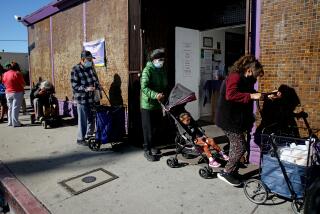HUNTINGTON BEACH : City’s First Shelter Helps Homeless Cope
- Share via
Just 18 months ago, Mary Jo and Ron were living comfortably in their one-bedroom Huntington Beach apartment. She was earning $2,100 per month at her word-processing job, and the couple was making plans for having their first child.
But then came a devastating series of health, employment and financial setbacks. And by May, they faced eviction, bankruptcy and mounting medical bills for their infant son, David.
Still, Mary Jo and Ron, who requested their last name be withheld, were among the lucky ones. When they and young David were finally forced out of their apartment on Aug. 22, they were homeless for just a few hours, before locating temporary housing--in a relatively cozy environment.
They are one of two families who, along with a single woman, are sharing a home at Huntington Beach’s first homeless shelter, which opened this month with the help of a $20,000 city grant.
The shelter is the 11th such facility opened during the past four years by Shelter for the Homeless, a Westminster-based nonprofit organization. Each costs between $25,000 and $28,000 per year to run, which is paid chiefly through private donations, said Jim Miller, the organization’s founder and executive director.
The newest facility is a comfortable, rented home, not unlike the other sizable, well-kept houses in this middle-class neighborhood of northwest Huntington Beach. The four-bedroom, two-bathroom house is clean, furnished and spacious, and has a television, microwave oven and a large back yard.
Miller said the living arrangements in the home are typical. Mary Jo and Ron share one bedroom, and David, who suffers from a respiratory disease and requires a bedside breathing monitor, has another bedroom to himself. The other family lives in the master bedroom, and the single resident stays in another of the smaller rooms.
Residents will be allowed to live in the home for up to four months. During that time, Miller works with various agencies throughout the county to find them permanent jobs and housing.
“Our goal is to get people off the streets and give them a comfortable, decent place to live, and support them with finding employment . . . and assistance in permanent housing,” Miller said.
Since Shelter for the Homeless can assist only a handful of families and singles at a time, Miller says he chooses residents based on “their willingness to get a job and get back into the mainstream.”
“With most of our families, there’s just been a tragedy at this particular time in their lives,” he said. “Because of a health reason or something else that’s caused them to lose their apartment, they’re out on the street. There are a lot of people who just can’t afford $600 or $700 a month for an apartment. And in most cases, if they can just get through this peak crisis, they’re able to go on.”
But, with an estimated 170 callers a day asking Miller for assistance, he acknowledges that those who ultimately receive housing are typically those who suddenly get lucky.
“This has been a blessing for us,” Mary Jo said. In addition to the couple’s financial straits, they were particularly concerned about how homelessness might affect 7-month-old David, who suffers from apnea, a breathing problem during sleep that frequently leads to “crib death.”
“It feels funny to say I’m homeless, yet I don’t feel homeless,” Mary Jo said. “I look at it as very temporary until we can get back on our feet. Maybe the new year, 1991, will bring us a new home. Or maybe it will come as a Christmas present.”
More to Read
Sign up for Essential California
The most important California stories and recommendations in your inbox every morning.
You may occasionally receive promotional content from the Los Angeles Times.













